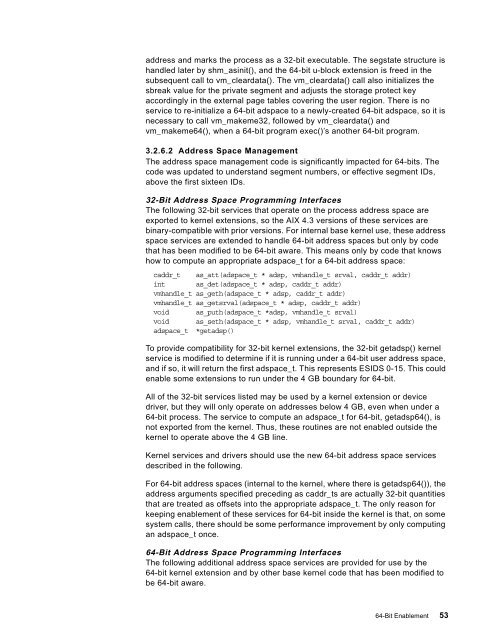AIX Version 4.3 Differences Guide
AIX Version 4.3 Differences Guide
AIX Version 4.3 Differences Guide
You also want an ePaper? Increase the reach of your titles
YUMPU automatically turns print PDFs into web optimized ePapers that Google loves.
address and marks the process as a 32-bit executable. The segstate structure is<br />
handled later by shm_asinit(), and the 64-bit u-block extension is freed in the<br />
subsequent call to vm_cleardata(). The vm_cleardata() call also initializes the<br />
sbreak value for the private segment and adjusts the storage protect key<br />
accordingly in the external page tables covering the user region. There is no<br />
service to re-initialize a 64-bit adspace to a newly-created 64-bit adspace, so it is<br />
necessary to call vm_makeme32, followed by vm_cleardata() and<br />
vm_makeme64(), when a 64-bit program exec()’s another 64-bit program.<br />
3.2.6.2 Address Space Management<br />
The address space management code is significantly impacted for 64-bits. The<br />
code was updated to understand segment numbers, or effective segment IDs,<br />
above the first sixteen IDs.<br />
32-Bit Address Space Programming Interfaces<br />
The following 32-bit services that operate on the process address space are<br />
exported to kernel extensions, so the <strong>AIX</strong> <strong>4.3</strong> versions of these services are<br />
binary-compatible with prior versions. For internal base kernel use, these address<br />
space services are extended to handle 64-bit address spaces but only by code<br />
that has been modified to be 64-bit aware. This means only by code that knows<br />
how to compute an appropriate adspace_t for a 64-bit address space:<br />
caddr_t as_att(adspace_t * adsp, vmhandle_t srval, caddr_t addr)<br />
int as_det(adspace_t * adsp, caddr_t addr)<br />
vmhandle_t as_geth(adspace_t * adsp, caddr_t addr)<br />
vmhandle_t as_getsrval(adspace_t * adsp, caddr_t addr)<br />
void as_puth(adspace_t *adsp, vmhandle_t srval)<br />
void as_seth(adspace_t * adsp, vmhandle_t srval, caddr_t addr)<br />
adspace_t *getadsp()<br />
To provide compatibility for 32-bit kernel extensions, the 32-bit getadsp() kernel<br />
service is modified to determine if it is running under a 64-bit user address space,<br />
and if so, it will return the first adspace_t. This represents ESIDS 0-15. This could<br />
enable some extensions to run under the 4 GB boundary for 64-bit.<br />
All of the 32-bit services listed may be used by a kernel extension or device<br />
driver, but they will only operate on addresses below 4 GB, even when under a<br />
64-bit process. The service to compute an adspace_t for 64-bit, getadsp64(), is<br />
not exported from the kernel. Thus, these routines are not enabled outside the<br />
kernel to operate above the 4 GB line.<br />
Kernel services and drivers should use the new 64-bit address space services<br />
described in the following.<br />
For 64-bit address spaces (internal to the kernel, where there is getadsp64()), the<br />
address arguments specified preceding as caddr_ts are actually 32-bit quantities<br />
that are treated as offsets into the appropriate adspace_t. The only reason for<br />
keeping enablement of these services for 64-bit inside the kernel is that, on some<br />
system calls, there should be some performance improvement by only computing<br />
an adspace_t once.<br />
64-Bit Address Space Programming Interfaces<br />
The following additional address space services are provided for use by the<br />
64-bit kernel extension and by other base kernel code that has been modified to<br />
be 64-bit aware.<br />
64-Bit Enablement 53
















